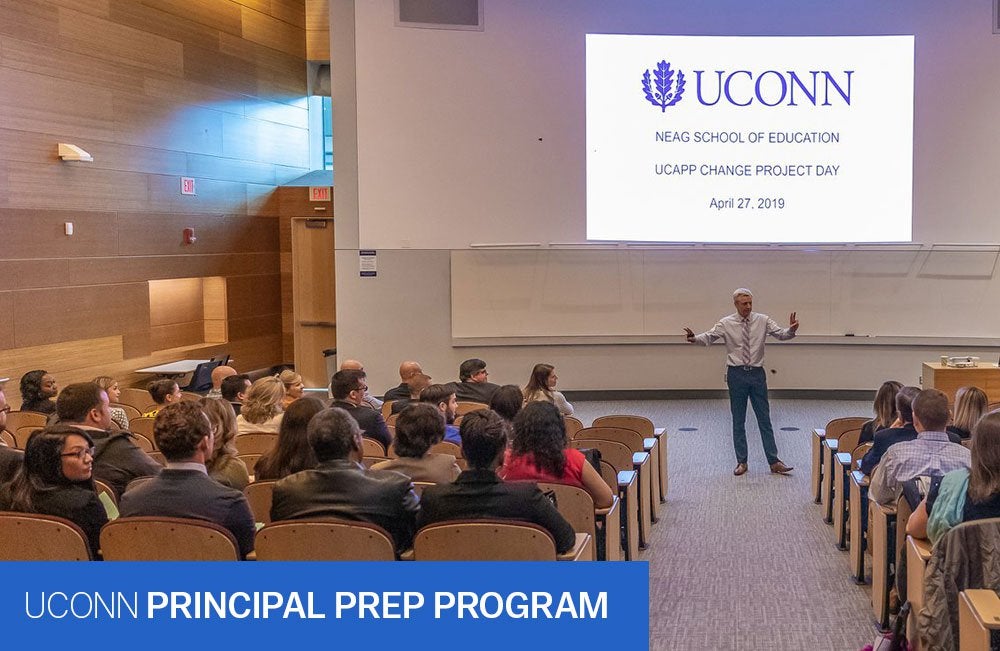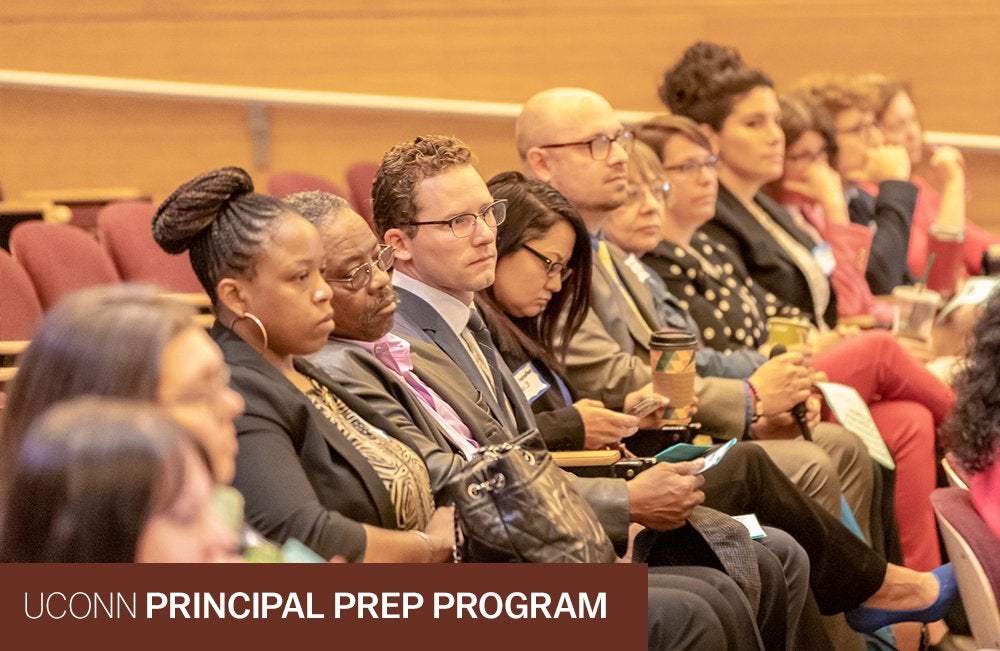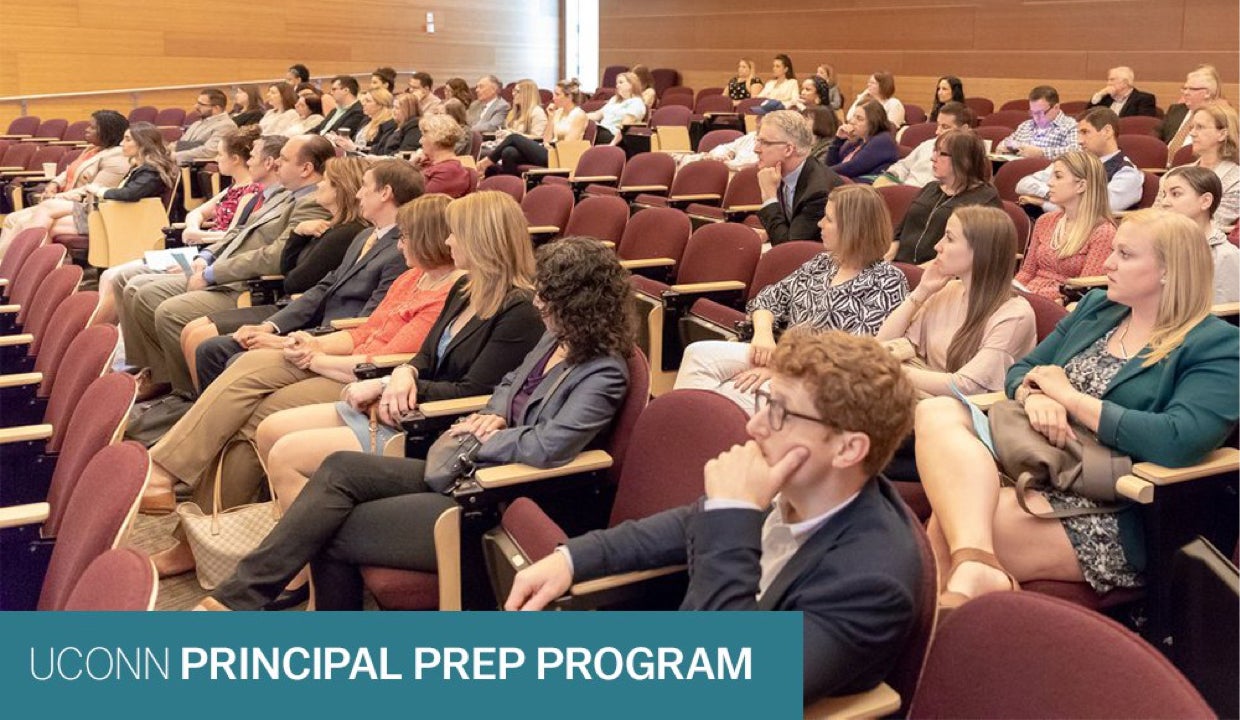This post is part of a series profiling the University of Connecticut’s efforts to strengthen its principal training program. The university is one of seven institutions participating in Wallace’s University Principal Preparation Initiative (UPPI), which seeks to help improve training of future principals so they are better prepared to ensure quality instruction and schools. A research effort documenting the universities’ efforts is underway. While we await its results, this series describes one university’s work so far.
These posts were planned and researched before the novel coronavirus pandemic spread in the United States. The work they describe predates the pandemic and may change as a result of it. The University of Connecticut is working to determine the effects of the pandemic on its work and how it will respond to them.
There are many facets to a principal training program and many stakeholders the program must satisfy. Over the past few weeks, this blog series has profiled several of the players who have helped shape one such program, the University of Connecticut Administrator Preparation Program (UCAPP). Previous posts have described how UCAPP has attempted to engage such stakeholders, including faculty members and district partners, in its efforts to improve its curriculum and practical experiences.
But what of the program’s students? With so many interests shaping its principal preparation program, how well is UCAPP addressing the needs of its students, who many consider UCAPP’s primary stakeholders? UCAPP connected the Wallace editorial team with four members of its class of 2021, the first class to train in the current iteration of the program, so we could seek out their views about the new program.
It’s still early in their tenure—they started the program in the summer of 2019 and were beginning the third of six semesters when Wallace interviewed them—but many are already noticing benefits of the program, especially the program’s curriculum, its internships and its new assessments.
A more connected curriculum
Sherry Farmer, a teacher of more than 20 years with a background in special education, was drawn to UCAPP in part because of the opportunities it offers to ensure equity in schools, especially for children with special needs. Her depth of experience with such children has given her a solid understanding of the ways in which teachers can ensure equity in individual classrooms. But teachers need larger, schoolwide systems to support that endeavor, and UCAPP is helping her figure out how to establish them.
“[UCAPP has] been very meticulous in helping us understand, piece by piece, how important it is to set up the systems within your school,” she said. “To build capacity and build leadership within your school and to allow people to take on roles that you can't take on.”
Several courses had to work together to help Farmer appreciate the complexities of that task. An instructional leadership course taught her how she can use data to spot inequities and help teachers address them. An organizational leadership course taught her how to engage parents and communities to establish the expectation of equity throughout the school. And a talent management course, which follows that organizational leadership course, taught her how to ensure that her staff meets such expectations.
“It's starting to make sense to me how they put the program in place for us,” she said. “I feel like they're building the capacity we need from one area so that we're ready to get to the next area.”
But a principal’s job is complex. There is much UCAPP must teach its students, from ensuring quality instruction to balancing budgets to managing school politics. Its agenda is packed; every semester, students must complete two six-week courses, each meeting once a week for three and a half hours, and a daylong workshop.
It’s a busy schedule, says Winallan Columbano, a high-school health and physical education teacher who taught in New York City for 10 years before enrolling in UCAPP. He appreciates the pace on some levels; he says it provides a thorough introduction to Connecticut school systems and familiarizes him with pre-high school instruction. But, he says, the schedule can sometimes feel a bit rushed.
“It’s a little bit short I would say, the six-class sessions,” he said. “By the time you get going with the professor, it’s almost over. So, in that sense, I wish I had a little more time.”
But another element of UCAPP helps make up for that hectic pace, Columbano says: internships.
From theory to practice
UCAPP internships place each student in an area school with a veteran principal for all six semesters of the program. The student visits that school regularly over two years and helps its principal with leadership responsibilities. The principal, which UCAPP calls a mentor, guides the student through a series of leadership tasks. Meanwhile, a leadership coach, generally a retired principal or a school-district leader, works closely with both student and mentor, advises the student and helps draw connections to concepts covered in class.
These internships, Columbano says, are helping him apply concepts he may only peripherally encounter in his coursework. “We’re able to apply what we’re learning,” he said. “The work that’s covered in the courses, you’re actually doing that in schools.”
Kimberly Monroe, who has taught math for 18 years and currently serves as a teacher leader, is relying heavily on that practical experience to prepare herself for the principalship. While her teaching experience is deep, she is in her first year in a leadership role and feels she has much to learn about managing the politics of the principalship. “There may be times when I'll have to balance what the priorities are,” she said, “based on someone else telling me what needs to happen versus what I see as being the most important.”
UCAPP’s organizational leadership course in the fall of 2019 helped lay the theoretical foundation to help manage such priorities, she said. Observing principals, both in the school in which she teaches and the one in which she is interning, is showing her how that foundation plays out in schools. “I see how they interact with people,” she said. “Listening and getting the full picture and hearing from both sides and looking at best practices, to then make a decision about what they'll ultimately do.”
“I've already learned several things from my internship principal,” she added, “and I think there's even more that I'll continue to learn.”
Leadership coaches, a new addition to the program, also help. Monroe said that her work with her coach is helping her build confidence, not just in her internship, but also in her role as a teacher leader. That role requires Monroe to observe and evaluate teachers, a responsibility she approached cautiously, wary of overstepping her bounds. “I want to be invited into your room,” she said of the teachers she has to observe. “I don't want to feel pushy and push my way into your room.”
Monroe therefore left it up to teachers to schedule time for her observations. Few did, so her UCAPP leadership coach urged her to be more proactive and propose times herself. “That has worked much better,” Monroe said, “It helped me to be a little more forthright with trying to encourage them to meet with me.”
Coaches also help ensure students use time wisely. Farmer says her coach has helped steer her away from the details of her current job and focus on what she must learn to become a principal. “I don’t want you doing lunch duty,” Farmer’s coach told her. “I want you to go in. I want you to have an agenda. I want you to have what it is you want to talk about with [your mentor principal].”
Coaches will not solve students’ problems, however. They will only help students think through them. “Very rarely, if at all in this program, have I felt like they’ve given us the answer,” Columbano said, “That’s nice, but it’s also a little frustrating. UConn has made it pretty clear that they would rather we face our problems now, maybe struggle with them, fight through them and figure it out.”
Both he and Farmer say that that focus on independent thought, with the support of instructors and leadership coaches, helps prepare them for the jobs ahead. “Nobody's going to give you the answer; it's going to be up to you to figure out the answer,” Farmer said. “And I’m getting more and more comfortable with not having the answer than I was just a few months ago.”
Tracking progress
To nudge its students towards such confidence, and to help ensure that they meet state requirements for principals, UCAPP introduced the “core assessment,” a series of projects designed to measure students’ progress in key areas of leadership. Students complete projects every semester, either in their own schools or those in which they’re interning, and work with their coaches every month to reflect on their performance, identify strengths and weaknesses and plan for future improvement. “That's really been important and helpful to me,” Farmer said. “To sit back and look at, what did I feel went well? What did I feel I would change?”
Teresa Maturino Rodriguez, a teacher of 20 years, also sees benefits in the core assessments, saying that they help students acclimate themselves to the twists and turns of the principalship. However, she said, they take a lot of time and she is not yet clear about the value of every required component. All students must complete the same projects, she added, even if they have years of experience with the practices those projects are meant to demonstrate. Some of these tasks can become rather onerous for students who are juggling classes, internships, families and day jobs.
“I feel like there's this other component hanging out there,” she said, expressing some discomfort with the addition to the workload. But she’s willing to give the assessments time to play themselves out. “I'm going to trust this is part of the learning process they're trying to create for us,” she added.
The benefits are more obvious to Columbano. The first step of the core assessment—an “organizational diagnosis” that asks students to investigate reasons behind an achievement gap of their choice at their internship school—helped him look beyond his previous focus on high-school phys-ed.
“Instead of looking at things strictly within your classroom,” he said, “it made me ask myself, ‘How do I fix this on a school level?’”
It’s helping him make an essential change to the way he sees education. “I’m always looking at things through a different lens now,” he said.
“I’m looking at it from a principal’s lens, not a teacher’s.”
Embracing change
It takes a lot of planning and adjustment to create a program that can stimulate such a change in perspective. Administrators say they are always learning from their experiences and tweaking the program to respond to feedback from students, faculty and community partners. That willingness to change, however, can complicate things for students.
Farmer, for example, was hoping to get summer schedules ready for her internship when we spoke to her in January. But her class schedule was still unclear, making it hard to plan ahead. “We find that they're still tweaking things up to the last minute,” she said. “For people like us, who want to know things way in advance, that's been a little bit frustrating,”
That frustration, however, may also be part of learning to be a principal. Columbano says that his time in UCAPP so far is beginning to make him more comfortable with the uncertainties of the principalship. “Will I know everything?” he said. “No. But I know that if I work at it, I can get to the right answers.”
STORIES FROM UCONN PRINCIPAL PREP PROGRAM









